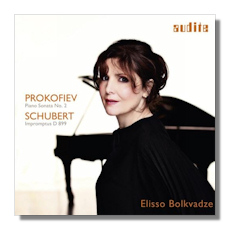
The Internet's Premier Classical Music Source
Related Links
-
Prokofieff Reviews
Schubert Reviews - Latest Reviews
- More Reviews
-
By Composer
-
Collections
DVD & Blu-ray
Books
Concert Reviews
Articles/Interviews
Software
Audio
Search Amazon
Recommended Links
Site News
 CD Review
CD Review
Elisso Bolkvadze Plays

- Serge Prokofieff: Piano Sonata #2 in D minor, Op. 14
- Franz Schubert: Impromptus, Op. 90 (D. 899)
- No. 1 in C minor
- No. 2 in E Flat Major
- No. 3 in G Flat Major
- No. 4 in A Flat Major
Elisso Bolkvadze, piano
Audite 97.719 48:28
My first encounter with Elisso Bolkvadze (b. 1967; Tbilisi, Georgia) was in 2012 when I reviewed her recording on the Cascavelle label of the Saint-Saëns Second Piano Concerto, coupled with works by Liszt and Rachmaninov (Cascavelle VCL3151). I found her performances quite fine and hoped that the disc's success might lead to further recordings. Well, my wish has been realized, and with performances even more impressive.
Bolkvadze's account of the Prokofiev Second Sonata is quite individual. She is a little quirky in her use of rubato, particularly in the first movement's opening and in the beginning of the development section. But she's still effective here in conveying Prokofiev's bitter-sweet lyricism and motoric drive. Her second movement is convincing in its muscular character and sense of humor and joy: she's not too percussive and her dynamics are well judged throughout. But it's her third movement that is the most impressive: unlike so many pianists, she conveys Prokofiev's gloomy and misty moods with a true grasp of its strange but mesmerizing lyricism, again with dynamics that seem perfectly suited to the music's dark character, and rubato that might at first sound overly hesitant but in the end strike the ear as subtle, if a little eccentric still. The finale is exciting and colorful, even if the pianist turns a little too percussive in the latter half. Graffman, Richter, Glemser and many others have offered fine accounts of this sonata, but this one by Bolkvadze is also a worthy entry, particularly notable for its highly imaginative third movement. Prokofiev mavens will certainly want this.
In many ways Bolkvadze's Schubert carries many of the same fingerprints regarding dynamics and rubato. But she is less extreme, a bit more straightforward. Yet, her take on the D. 899 Impromptus is just as individual. In #1 her phrasing tends to point up the lyricism in a Romantic and epic manner: her tempos are fairly deliberate, her legato is rich and buttery and she obtains big washes of sound at climaxes. #2 is perhaps a bit on the muscular side in places, but otherwise quite fine in its sense of lightness and playfulness. In #3 the left-hand accompaniment in the opening is lovely in its creamy flow, and the unrest and agitation later on are effectively stormy, thanks again to Bolkvadze's subtle use of dynamics. The music sounds so disarmingly delicate and angelic in the opening of #4, and then turns tortured and agitated, as Bolkvadze's phrasing captures the heartrending character of the music with pianos that rise so subtly to fortes, whether gradually or quickly, and with perfectly judged tempo manipulation. This is a fine set of these Impromptus, perhaps rivaling the excellent efforts of Perahia and Uchida.
The sound reproduction on this Audite CD is overly reverberant, though still quite acceptable. The only other cavil is that the disc's timing of 48:28 is quite paltry. There was room for another major Prokofiev sonata or for all but some of the later Schubert sonatas. Still, the playing on this CD is of a high enough caliber to warrant recommendation.
Copyright © 2015, Robert Cummings





















